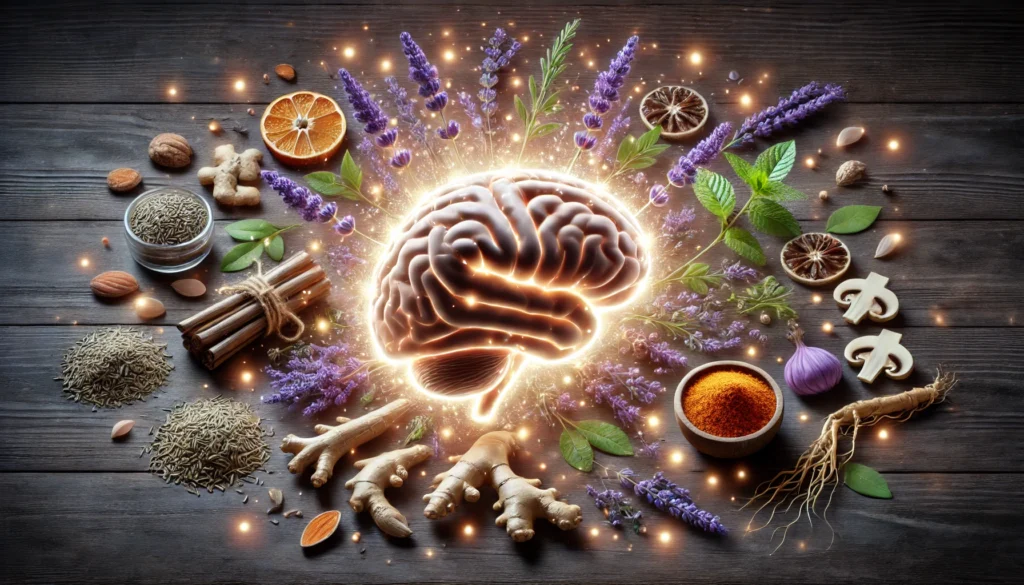In the fast-paced world we live in, it’s easy to overlook the importance of brain health. Yet, just like any other part of our body, the brain requires care and attention to function optimally. This article explores natural methods for brain healing and recovery, offering insights and practical advice for enhancing mental well-being.
You may also like: Top Herbs to Enhance Your Focus
Understanding Brain Health
The brain is a marvel of biological engineering, capable of astonishing feats of memory, creativity, and problem-solving. However, it is also susceptible to damage from stress, poor nutrition, environmental toxins, and the natural aging process. Understanding how to support and heal the brain naturally can lead to improved cognitive function and overall well-being.
Historical Context: Ancient Practices
Long before modern medicine, ancient civilizations recognized the importance of brain health. Practices such as meditation, yoga, and the use of herbal remedies have been used for centuries to promote mental clarity and emotional balance. These time-honored practices lay the foundation for many of the natural methods we use today. Ancient Egyptian, Chinese, and Ayurvedic traditions all integrated brain health into their wellness practices, using natural resources available in their environments.
The Greeks and Romans also contributed significantly to our understanding of brain health. The philosopher Hippocrates emphasized the importance of a balanced lifestyle for maintaining mental clarity. Meanwhile, Roman scholars documented the use of various herbs and dietary practices to support cognitive functions, setting the stage for modern herbal medicine.
Modern Science Meets Ancient Wisdom
Recent scientific research has begun to validate many of these ancient practices, highlighting their efficacy in promoting brain health. For example, studies have shown that meditation can increase the thickness of the prefrontal cortex, a region of the brain associated with decision-making and attention. This intersection of modern science and ancient wisdom offers a holistic approach to nurturing brain health.
The impact of yoga on brain health is another area of growing interest. Research suggests that regular yoga practice can enhance brain structure and function, improving memory, attention, and emotional regulation. These findings support the integration of yoga into modern wellness routines as a natural method for brain recovery.
Herbal medicine, a core component of ancient healing practices, is also gaining scientific backing. Herbs like ginkgo biloba and ashwagandha have been studied for their neuroprotective properties, offering potential benefits for cognitive health and stress reduction. This resurgence of interest in herbal remedies highlights the timeless relevance of ancient wisdom in supporting brain health.
The Role of Lifestyle Choices
Lifestyle choices play a crucial role in maintaining brain health. Regular physical activity, a balanced diet, and adequate sleep are foundational elements that support cognitive function and resilience. Adopting healthy lifestyle habits can mitigate the effects of stress and environmental toxins, promoting long-term brain health.
Mindfulness practices, such as meditation and deep breathing, are also vital components of a brain-healthy lifestyle. These practices reduce stress and enhance emotional regulation, contributing to improved cognitive performance and overall well-being. Embracing mindfulness as a daily habit can foster mental clarity and resilience.
Diet and Nutrition: Fueling the Brain
A balanced diet rich in nutrients is crucial for brain health. Omega-3 fatty acids, antioxidants, and vitamins play significant roles in maintaining and repairing brain cells.
Superfoods for Brain Health
- Fatty Fish: Rich in omega-3 fatty acids, fish like salmon and sardines support brain cell structure and function. Regular consumption of fatty fish has been linked to enhanced cognitive performance and a reduced risk of neurodegenerative diseases. These fish provide essential nutrients that nourish the brain and support its complex activities.
- Berries: Packed with antioxidants, berries can help reduce inflammation and oxidative stress in the brain. Blueberries, strawberries, and blackberries are particularly beneficial, offering a rich source of flavonoids that support memory and learning. Incorporating a variety of berries into your diet can provide a delicious and nutritious boost to brain health.
- Nuts and Seeds: These are excellent sources of vitamin E, which can protect against cognitive decline. Almonds, walnuts, and sunflower seeds are rich in healthy fats and antioxidants that support brain function. Adding a handful of nuts and seeds to your daily diet can enhance cognitive performance and promote long-term brain health.
Hydration and Brain Function
Adequate hydration is often overlooked but is essential for maintaining cognitive function. Even mild dehydration can impair mood, memory, and brain performance. Drinking enough water throughout the day helps maintain the brain’s optimal functioning and supports mental clarity.
The brain is composed of approximately 75% water, highlighting the importance of hydration for maintaining neural communication and overall brain health. Ensuring sufficient water intake can help prevent headaches, fatigue, and concentration difficulties, all of which can impair cognitive function.
Incorporating hydrating foods, such as fruits and vegetables, into your diet can also support brain health. Foods like watermelon, cucumber, and oranges provide both hydration and essential nutrients that nourish the brain. Maintaining a balance of water-rich foods and beverages is crucial for optimal brain performance.
The Impact of Dietary Patterns
The Mediterranean diet, rich in fruits, vegetables, whole grains, and healthy fats, has been associated with improved brain health and a lower risk of cognitive decline. This dietary pattern emphasizes nutrient-dense foods that support brain function and protect against age-related cognitive decline.
Plant-based diets, rich in antioxidants and anti-inflammatory compounds, also offer potential benefits for brain health. These diets promote a diverse intake of nutrients that support cognitive function and reduce the risk of neurodegenerative diseases. Incorporating a variety of plant-based foods into your diet can enhance brain health and overall well-being.
Intermittent fasting is another dietary approach gaining attention for its potential benefits on brain health. Research suggests that intermittent fasting can enhance cognitive function and promote brain resilience by reducing oxidative stress and inflammation. Exploring different fasting patterns can offer insights into optimizing brain health through dietary practices.

Exercise: The Brain-Body Connection
Physical activity is not only beneficial for the body but also for the brain. Exercise increases blood flow to the brain, promoting the growth of new neurons and enhancing cognitive functions.
Types of Exercise for Brain Health
- Aerobic Exercise: Activities such as running, cycling, or swimming can boost mood and cognitive abilities. These exercises increase heart rate, which enhances blood flow to the brain and supports the growth of new brain cells. Incorporating regular aerobic exercise into your routine can improve memory, attention, and overall cognitive performance.
- Strength Training: Lifting weights or resistance exercises can improve memory and mental sharpness. Strength training promotes the release of growth factors that support brain health and protect against age-related cognitive decline. Incorporating strength training exercises into your fitness regimen can enhance brain function and resilience.
- Mind-Body Exercises: Practices like yoga and tai chi combine physical movement with mental focus, supporting both brain and body health. These exercises promote relaxation, reduce stress, and enhance mindfulness, contributing to improved cognitive function and emotional well-being. Embracing mind-body exercises as part of your routine can foster a holistic approach to brain health.
Exercise and Neuroplasticity
Exercise plays a vital role in promoting neuroplasticity, the brain’s ability to adapt and reorganize itself. Regular physical activity stimulates the production of brain-derived neurotrophic factor (BDNF), a protein that supports the growth and maintenance of brain cells. Engaging in a variety of exercises can enhance neuroplasticity and support cognitive resilience.
The impact of exercise on neuroplasticity extends beyond the brain’s structure to its function. Regular physical activity improves synaptic plasticity, enhancing communication between neurons and supporting learning and memory. Embracing an active lifestyle can promote brain health and cognitive performance throughout life.
Exercise as a Mood Enhancer
Physical activity is a powerful tool for boosting mood and reducing symptoms of anxiety and depression. Exercise stimulates the release of endorphins, neurotransmitters that promote feelings of happiness and well-being. Incorporating regular exercise into your routine can enhance emotional regulation and support mental health.
Group exercise activities, such as team sports or fitness classes, offer additional benefits for mood enhancement. The social interaction and sense of community associated with group exercise can provide emotional support and motivation. Exploring different forms of exercise can help you find activities that enhance both brain health and emotional well-being.
Sleep: The Brain’s Repair Mechanism
Sleep is vital for brain recovery and healing. During sleep, the brain consolidates memories, clears out toxins, and repairs itself.
Optimizing Sleep for Better Brain Health
- Establish a Routine: Going to bed and waking up at the same time daily can regulate the body’s internal clock. Consistency in sleep patterns supports the brain’s natural rhythms and enhances restorative sleep. Creating a bedtime routine can signal the brain to wind down and prepare for rest.
- Create a Restful Environment: A dark, quiet, and cool bedroom can promote deeper, more restorative sleep. Minimizing distractions and optimizing the sleep environment can enhance sleep quality and support brain health. Investing in comfortable bedding and blackout curtains can contribute to a restful night’s sleep.
- Limit Screen Time: Reducing exposure to blue light from screens before bed can improve sleep quality. Blue light can interfere with the production of melatonin, a hormone that regulates sleep. Establishing a technology-free wind-down routine before bed can support the brain’s transition to sleep.
The Importance of Sleep Stages
Understanding the different stages of sleep and their impact on brain health is crucial for optimizing rest. Deep sleep, or slow-wave sleep, is essential for physical recovery and memory consolidation. Prioritizing restful sleep can enhance cognitive function and support brain resilience.
REM sleep, characterized by vivid dreaming, plays a vital role in emotional processing and creativity. Ensuring sufficient REM sleep can enhance problem-solving abilities and emotional regulation. Fostering a sleep environment that supports all stages of sleep is essential for overall brain health.
Sleep Disorders and Brain Health
Sleep disorders, such as insomnia and sleep apnea, can significantly impact brain health and cognitive function. Addressing sleep disorders through lifestyle modifications, medical interventions, or therapy can improve sleep quality and support brain recovery. Seeking professional guidance can offer solutions for optimizing sleep and enhancing brain health.
Mindfulness and Stress Reduction
Chronic stress can harm the brain, affecting memory, mood, and cognitive function. Mindfulness practices such as meditation and deep breathing exercises can reduce stress and promote brain health.

The Science Behind Mindfulness
Research has shown that mindfulness can decrease the size of the amygdala, the brain’s stress center, while increasing the size of the prefrontal cortex, enhancing emotional regulation and cognitive focus. These structural changes support the brain’s ability to manage stress and improve overall cognitive function.
Mindfulness practices also promote neuroplasticity, enhancing the brain’s ability to adapt and reorganize itself. Regular mindfulness practice can improve attention, memory, and emotional regulation, contributing to a more resilient brain. Embracing mindfulness as a daily habit can foster mental clarity and well-being.
Techniques for Practicing Mindfulness
Mindfulness meditation, a practice focused on present-moment awareness, is a powerful tool for reducing stress and enhancing cognitive function. Guided meditation sessions and mindfulness apps can offer support and structure for developing a regular practice. Exploring different meditation techniques can help you find the approach that resonates with you.
Breathwork, or deep breathing exercises, can quickly reduce stress and promote relaxation. Techniques such as diaphragmatic breathing or box breathing can be practiced anytime, anywhere, to calm the mind and support brain health. Incorporating breathwork into your daily routine can enhance emotional regulation and cognitive performance.
Mindfulness-based stress reduction (MBSR) programs offer a structured approach to integrating mindfulness into daily life. These programs combine meditation, yoga, and mindfulness exercises to reduce stress and enhance well-being. Participating in an MBSR program can provide valuable tools for supporting brain health and resilience.
Nootropics and Supplements
For those seeking to optimize brain health, nootropics and supplements can be a valuable addition. These substances are designed to enhance cognitive function, memory, and creativity.
Popular Nootropics
- Caffeine: A well-known stimulant that can improve focus and alertness. Caffeine enhances the release of neurotransmitters like dopamine and serotonin, boosting mood and cognitive performance. Consuming caffeine in moderation can provide a quick mental boost and support cognitive function.
- Ginkgo Biloba: An herbal supplement that may enhance memory and cognitive speed. Ginkgo biloba is believed to improve blood flow to the brain, supporting cognitive function and reducing symptoms of anxiety. Including ginkgo biloba in your supplement regimen can offer potential benefits for brain health.
- Bacopa Monnieri: Traditionally used in Ayurvedic medicine, this herb is believed to enhance brain function and reduce anxiety. Bacopa monnieri supports memory and learning by promoting the growth of dendrites, the branches of nerve cells. Exploring the use of Bacopa monnieri can offer insights into its potential cognitive benefits.
The Role of Vitamins and Minerals
Certain vitamins and minerals play a crucial role in supporting brain health. B vitamins, particularly B6, B12, and folate, are essential for neurotransmitter production and cognitive function. Ensuring sufficient intake of these vitamins through diet or supplements can support brain health and prevent cognitive decline.
Omega-3 fatty acids, found in fish oil supplements, are vital for maintaining brain cell structure and function. These essential fats support cognitive performance and reduce the risk of neurodegenerative diseases. Including omega-3 supplements in your routine can enhance brain health and resilience.
Antioxidants, such as vitamin C and vitamin E, protect the brain from oxidative stress and support cognitive function. Incorporating antioxidant-rich foods and supplements into your diet can enhance brain health and promote long-term cognitive performance.
Personalized Supplementation
Personalized supplementation, tailored to individual needs and health goals, offers a targeted approach to supporting brain health. Working with a healthcare professional or nutritionist can help identify specific nutrient deficiencies and optimize your supplement regimen. Personalized supplementation can enhance cognitive function and support overall well-being.
Future Implications and Trends
As our understanding of brain health evolves, so too do the methods we use to support it. The future of brain health lies in the integration of technology, personalized medicine, and ancient wisdom.
Emerging Technologies
The rise of neurofeedback, brain-computer interfaces, and personalized brain health programs are paving the way for new, innovative approaches to brain care. These technologies offer real-time insights into brain function and the potential to enhance cognitive performance through targeted interventions.
Neurofeedback, a technique that trains the brain to self-regulate, is gaining popularity as a non-invasive method for improving cognitive function and emotional regulation. This technology offers a personalized approach to brain health, supporting mental clarity and resilience.
Brain-computer interfaces, which enable direct communication between the brain and external devices, hold promise for enhancing cognitive function and supporting individuals with neurological disorders. These interfaces offer potential applications in rehabilitation, cognitive enhancement, and personalized brain care.
The Role of Personalized Medicine
Personalized medicine, which tailors healthcare to individual genetic and lifestyle factors, is transforming the landscape of brain health. Advances in genetic testing and biomarker analysis offer insights into individual cognitive profiles and potential interventions for optimizing brain function.
Precision nutrition, a component of personalized medicine, emphasizes individualized dietary recommendations based on genetic and metabolic factors. This approach supports brain health by providing targeted nutrition that addresses specific cognitive needs and vulnerabilities.
Integrating personalized medicine into brain health practices offers a comprehensive approach to enhancing cognitive function and resilience. Collaborating with healthcare professionals to develop personalized brain health plans can optimize well-being and support long-term cognitive performance.
The Integration of Ancient Wisdom
The fusion of ancient practices with modern science offers a holistic approach to brain health. Integrating time-honored practices, such as meditation, yoga, and herbal medicine, with cutting-edge research and technology supports a comprehensive strategy for nurturing brain health.
The resurgence of interest in ancient wisdom highlights its relevance in addressing modern cognitive challenges. Embracing these practices offers a sustainable and natural approach to supporting brain health and enhancing cognitive function.
As we continue to explore the complexities of the brain, the integration of ancient wisdom and modern science will shape the future of brain health. This holistic approach offers a wealth of opportunities for healing, growth, and cognitive resilience.

Conclusion
Healing the brain naturally is a holistic process that combines diet, exercise, sleep, mindfulness, and supplementation. By incorporating these natural methods into daily life, one can support brain health, enhance cognitive function, and improve overall well-being.
Embracing these practices not only fosters mental clarity and resilience but also enriches life in profound ways. As we continue to explore and understand the brain’s complexities, the potential for healing and growth remains boundless. By prioritizing brain health, we can unlock new levels of cognitive performance, emotional well-being, and personal fulfillment.
The journey to optimal brain health is ongoing, offering endless opportunities for discovery and transformation. By integrating natural methods and embracing a holistic approach, we can nurture our brains and unlock their full potential.
Further Reading:
The Influence of Diet and Physical Activity on Brain Repair and Neurosurgical Outcome
Brain recovery after alcohol and other drug use
Brain healing after injury given a natural boost
Important Note: The information contained in this article is for general informational purposes only, and should not be construed as health or medical advice, nor is it intended to diagnose, prevent, treat, or cure any disease or health condition. Before embarking on any diet, fitness regimen, or program of nutritional supplementation, it is advisable to consult your healthcare professional in order to determine its safety and probable efficacy in terms of your individual state of health.
Regarding Nutritional Supplements Or Other Non-Prescription Health Products: If any nutritional supplements or other non-prescription health products are mentioned in the foregoing article, any claims or statements made about them have not been evaluated by the U.S. Food and Drug Administration, and such nutritional supplements or other health products are not intended to diagnose, treat, cure, or prevent any disease.


